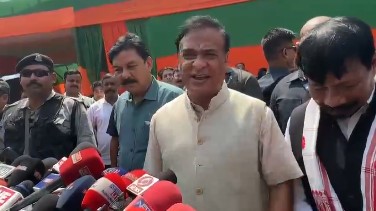Assam Chief Minister Dr Himanta Biswa Sarma commended Olivia Kalita, a student from Handique Girls’ College, for her insightful suggestions regarding child marriage and the recently launched ‘Nijut Moina’ scheme. Kalita’s thought-provoking views have sparked discussions on gender roles and equality, especially in the context of combating child marriage and trafficking in Assam.
CM Himanta acknowledged Kalita’s input during the scheme’s launch, stating, “I received a very good suggestion from a young student during the launch of the Nijut Moina Asoni. We will work upon the suggestion and do the needful in this regard on creating more awareness for boys to prevent child marriage.”
Kalita, currently pursuing an English degree, shared her concerns, asserting that while the ‘Nijut Moina’ scheme is a significant step forward, it primarily focuses on women and girls, potentially neglecting the crucial role of educating boys on social issues like child marriage and trafficking. She pointed out that addressing only one side of the equation might not lead to long-term solutions.
“After researching the scheme, I realised that while it tackles vital issues like child marriage, it predominantly targets women and girls. However, a one-sided approach can be detrimental if we fail to consider boys’ roles in these issues,” Kalita explained. She highlighted that in many cases, boys’ families initiate child marriages, making it imperative to educate boys on respect, consent, and the consequences of such practices.
Kalita’s perspective is informed by her upbringing in a household where her mother, a police officer, frequently discussed the harsh realities of child trafficking and gender-based violence.
“I grew up hearing stories of child trafficking, mostly initiated by men. My mother always warned me about the dangers of going out alone because these things actually happen. It’s not just about protecting girls; boys need to be taught about respect, consent, and the consequences of their actions,” she said.
One of Kalita’s key suggestions is the inclusion of comprehensive sex education in schools, which she believes is essential for preventing child marriage and other forms of gender-based exploitation. “Sex education is one of the main things missing in our school system. If boys and girls were taught about safe sex, contraception, and mutual respect, we would see a decrease in harmful practices like child marriage and trafficking,” she noted.
Kalita also touched on the psychological impact of current government schemes that disproportionately favour girls. She expressed concern that this could inadvertently create resentment among boys, leading to a deeper gender divide.
“When the government provides all these resources — money, scooters, laptops — to girls while offering little to boys, it creates a sense of inequality. This could lead to boys harbouring feelings of hatred towards girls, exacerbating the gender divide. Feminism is about equality, not putting one gender above the other,” she argued.
Challenging traditional views on feminism, Kalita advocated for true gender equality, where both genders are treated equally by government policies. “I don’t support the idea of feminism that elevates women at the expense of men. We need to treat both genders equally, and that starts with our government’s policies. If we don’t, we risk perpetuating the very patriarchal structures we’re trying to dismantle,” she concluded.
Kalita’s comments have opened up a broader conversation on how to effectively address social issues like child marriage by involving and educating both boys and girls, ensuring that future efforts are inclusive and equitable.

















